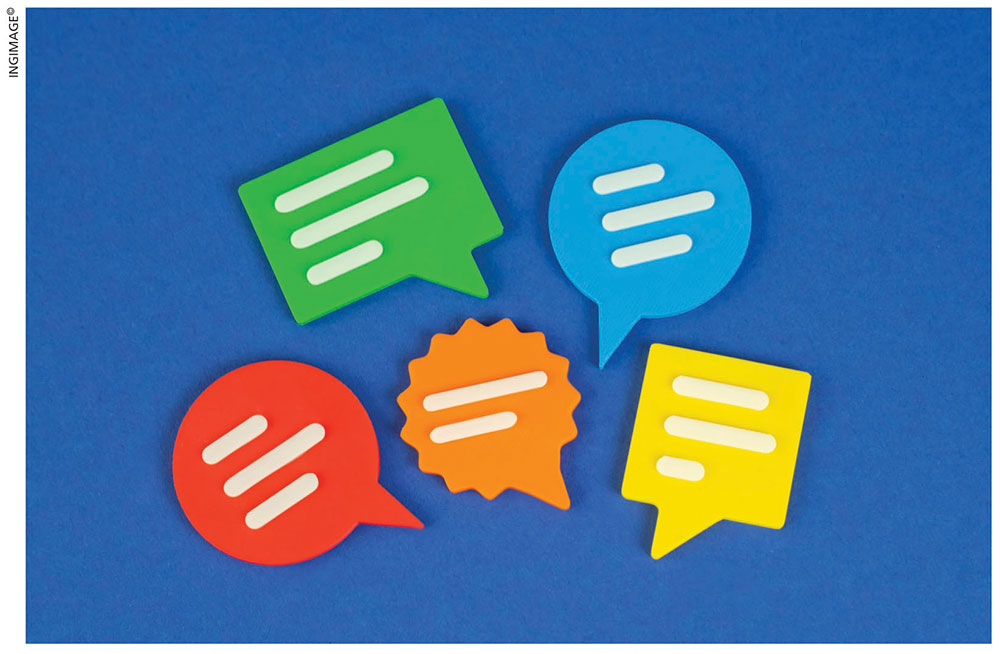ECHO CHAMBERS
The internet has completely transformed the way we search for, find, consume and utilise information – and algorithms play a key role in this transformation.

HOOKED ON ALGORITHMS
Manilka Ediriweera describes the impact of being locked in an echo chamber

These algorithms run your digital life, and are responsible for deciding which cat video will make you laugh and what political hot takes keep you scrolling. It feeds you exactly what you like, gets you swiping and keeps you hooked.
So what are algorithms?
Picture yourself scrolling through social media, and a clip pops up where someone is making a witty remark about a political issue. The humour captures your attention; and before you know it, you’re watching and engaging with a stream of similar videos.
This is not a coincidence nor is it random. It’s the algorithm at work, serving you content designed to capture your attention, entertain you and reinforce existing views.
At their core, algorithms are well-established rules and data driven processes that determine what users see. They analyse user behaviour based on your likes to comments, shares and interactions so they can predict what will keep you engaged on the platform for extended periods.
Every single interaction you make online – whether it’s liking a post or skipping a video – feeds into this system of personalisation. And based on the data gathered, these algorithms prioritise contentthat ismost likely to grab and engage your attention, and keep you coming back for more.
And because platforms are constantly vying for your time and attention, algorithms are continually refined, updated and optimised to capture users’ attention more effectively than before.
In addition to engaging our attention, they can also trap us in echo chambers. The idea behind this is straightforward: if your political views lean towards one end of the spectrum for instance, you will naturally follow and stay connected to such content.
The algorithm then takes note of this, and proceeds to show you more of the same type of information that echoes your beliefs and ways of thinking. Over time, your views harden and alternative perspectives take a backseat.
In other words, the algorithm amplifies one narrative.
To the uninformed mind, it can feel uncanny – as if social media platforms are reading your mind and knowing what you need even before you know it. While it doesn’t seem harmful and even helpful at first glance however, it comes at a cost. And that price is consistently reduced exposure to diverse ideas and ways of thinking.
By curating social media feeds so tightly around user preferences, these algorithms reinforce confirmation bias, which can have a ripple effect.
While social media is often praised for connecting the world and exposing people to diverse perspectives, the reality is that algorithms also do the opposite. They give us more of what we already agree with and makes us gravitate towards people who think the same way.
Eventually, it becomes dangerously easy to believe that our opinion is the only valid one.
One could say that an echo chamber isn’t an entirely new phenomenon and the concept has always existed. Our views are shaped by the context we grow up in and people around us – because human beings tend to mirror the wants, opinions and behaviours of those around them.
For instance, our earliest beliefs weren’t formed online. They were shaped by family, friends, schools and communities. This means we absorb values, habits and norms from those around us.
In other words, we’re conditioned from the beginning of life; and this makes it easier for us to mistake the familiar for the full picture and unable to see what lies beyond our immediate experience.
It is comparable to Plato’s allegory of the cave, which holds true to this day.
Imagine spending your entire life in a dark cave, facing a wall and seeing only shadows cast by objects behind you backlit by a fire. And it’s by turning around and escaping the walls of the cave that you would be able to see the environment as it truly is.
In today’s world, you can swap the shadows for social media feeds and the comparison still holds. The cave is no longer a dark chamber; it’s your phone screen, curated feed or ‘subreddit.’
The danger here is that our limited exposure to information makes it easy for us to mistake that for the full reality. When our feeds constantly reflect our own thoughts and beliefs, being critical of them becomes difficult. And anyone who disagrees will appear wrong, uninformed or on the other side.
When we stop questioning our beliefs, we fail to consider other perspectives. And with AI generated content, deepfakes and so on, this risk has doubled.
So the best defence against echo chambers is critical thinking, self-awareness and a willingness to seek the diverse viewpoints of others.
Algorithms prioritise content





